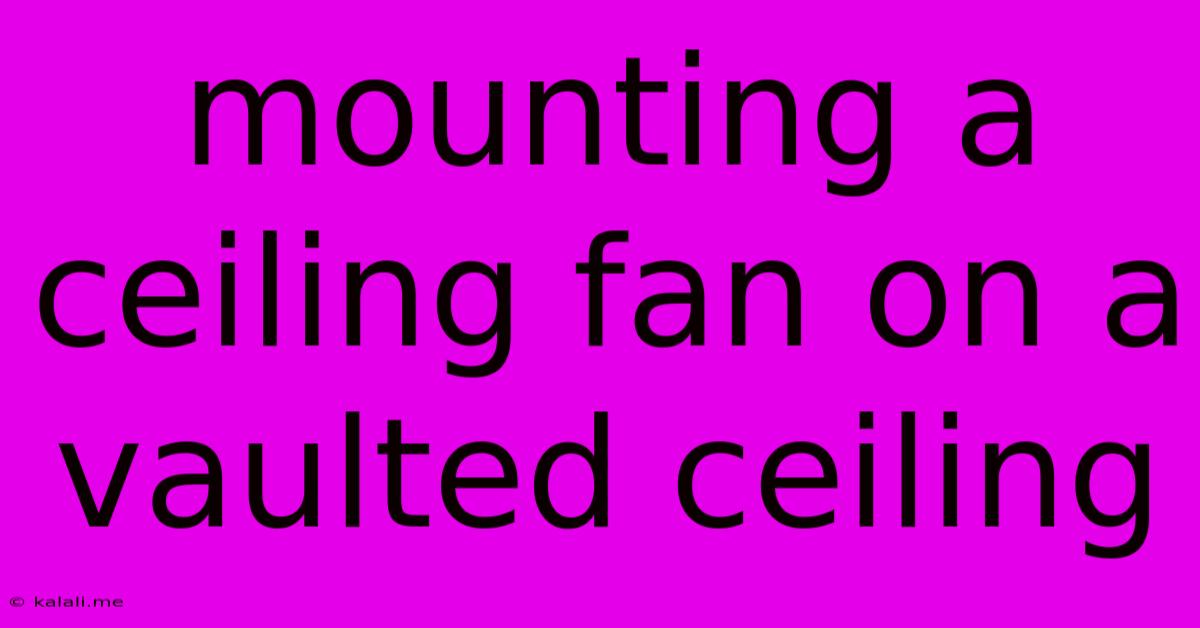Mounting A Ceiling Fan On A Vaulted Ceiling
Kalali
May 24, 2025 · 4 min read

Table of Contents
Mounting a Ceiling Fan on a Vaulted Ceiling: A Comprehensive Guide
Installing a ceiling fan in a room with a vaulted ceiling adds a stylish touch and welcome breeze, but it presents unique challenges. This comprehensive guide will walk you through the process, ensuring a safe and successful installation. Whether you're tackling a simple sloped ceiling or a more complex vaulted design, we'll cover the essential steps and considerations. Remember, safety is paramount – if you're uncomfortable with any part of the process, consult a qualified electrician.
Understanding the Challenges of Vaulted Ceilings
Vaulted ceilings, with their dramatic slopes and heights, require a different approach than standard flat ceiling installations. The primary challenge lies in securely attaching the fan's mounting bracket to the ceiling joists, which may be inaccessible or require creative solutions. You'll also need to consider the increased distance from the fan blades to the floor, impacting airflow and potentially requiring a larger diameter fan for optimal performance. Finally, the angled surface complicates the wiring process, requiring careful planning and execution.
Essential Tools and Materials
Before you begin, gather these necessary tools and materials:
- Ceiling fan: Choose a fan specifically designed for sloped or vaulted ceilings. These often include adjustable mounting brackets and longer downrods to ensure proper clearance.
- Stud finder: Crucial for locating ceiling joists for secure mounting.
- Drill with appropriate drill bits: For pilot holes and fastening screws.
- Screwdrivers (Phillips and flathead): For assembling the fan and mounting bracket.
- Wire strippers and connectors: For connecting the fan's wiring to the house wiring.
- Voltage tester: To ensure power is off before working with wiring.
- Level: To ensure the fan is properly aligned.
- Measuring tape: For accurate measurements and planning.
- Safety glasses and gloves: To protect yourself from injury.
- Ladder or stable platform: To safely reach the ceiling.
- Appropriate length downrod (if needed): Vaulted ceilings often require longer downrods than standard installations.
- Mounting bracket (possibly): Some fans may require a specific bracket for angled ceilings.
Step-by-Step Installation Guide
1. Power Down: Always turn off the power to the circuit at the breaker box before starting any electrical work. Use a voltage tester to double-check that the power is off.
2. Locate Ceiling Joists: Use a stud finder to accurately locate the ceiling joists. These are the structural members that will support the weight of the fan. Mark their locations clearly.
3. Install the Mounting Bracket: This step varies depending on the fan and ceiling type. Some fans come with adjustable brackets designed for sloped ceilings, while others may require additional support structures. Carefully follow the manufacturer's instructions. Ensure the bracket is securely fastened to the joists.
4. Install the Downrod (If Needed): Connect the downrod to the mounting bracket and adjust its length to achieve the desired height. This step is crucial for maintaining adequate clearance between the fan blades and any obstacles below.
5. Attach the Fan Motor Housing: Securely attach the fan motor housing to the downrod or mounting bracket, following the manufacturer's instructions.
6. Wire the Fan: Carefully connect the fan's wires to the house wiring, matching the corresponding colors (black to black, white to white, ground to ground). Use wire connectors to create secure connections. Double-check all connections before proceeding.
7. Attach the Fan Blades: Attach the fan blades to the motor housing, ensuring they are securely fastened and balanced.
8. Test and Enjoy: Turn the power back on at the breaker box. Test the fan to ensure it operates correctly and is properly balanced.
Choosing the Right Ceiling Fan
When selecting a ceiling fan for a vaulted ceiling, consider the following factors:
- Motor Size and Airflow: A larger diameter fan with a more powerful motor might be necessary to effectively circulate air in a high-ceilinged room.
- Downrod Length: Select a fan with a downrod that allows for adequate clearance between the fan blades and the floor. Adjustable downrods offer flexibility.
- Mounting Bracket Compatibility: Choose a fan with a mounting bracket suitable for angled ceilings or that allows for modifications to secure it properly.
- Style and Aesthetics: Select a fan that complements the overall design and style of the room.
By carefully following these steps and selecting the appropriate fan, you can successfully install a ceiling fan on your vaulted ceiling, enhancing both the aesthetics and functionality of your space. Remember to consult a professional if you encounter any difficulties or are unsure about any aspect of the installation.
Latest Posts
Latest Posts
-
Blender How To Select Through Object
May 25, 2025
-
Linux Expand Partition To Fill Disk
May 25, 2025
-
I See Said The Blind Man Whole Quote
May 25, 2025
-
How Long Can You Keep Gas In A Gas Can
May 25, 2025
-
Could Not Chdir To Home Directory
May 25, 2025
Related Post
Thank you for visiting our website which covers about Mounting A Ceiling Fan On A Vaulted Ceiling . We hope the information provided has been useful to you. Feel free to contact us if you have any questions or need further assistance. See you next time and don't miss to bookmark.